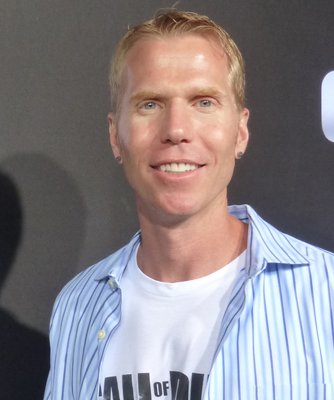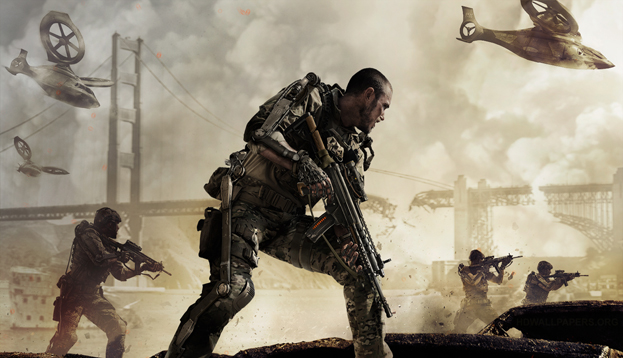Activision has another $1 billion Call of Duty game in its bestselling franchise. Call of Duty: Advanced Warfare is the first COD game from
 Sledgehammer Games co-founder Michael Condrey
Sledgehammer Games co-founder Michael Condrey
Sledgehammer Games. While casting Kevin Spacey as the campaign antagonist has attracted mainstream coverage, it’s the multiplayer gameplay that fans live for. Activision has partnered with Microsoft over the past three years to award $3 million to the best COD teams in the world through the Call of Duty Championship. The fourth worldwide tournament kicks off this fall with Call of Duty: Advanced Warfare as the centerpiece. Michael Condrey, co-founder and studio head at Sledgehammer Games, explains why eSports was a focus for the new COD game and how pro gamers helped the team craft the multiplayer experience in this exclusive interview.
How did you work with eSport pros in designing the multiplayer for Call of Duty: Advanced Warfare?
Really from Day 1 the multiplayer experience was based off of fan feedback, and that includes the eSports and competitive community. We’ve had designers from the eSports community imbedded in the team. We worked closely with competitors to really listen and we view them as a loud voice of really great change to the franchise that helps everybody. They’ve come in and given us great suggestions. They’ve helped us figure out what’s the best way to balance the game, new map designs, what modes to bring back. That intimate engagement with them and with all fans has really helped make Advanced Warfare better for everyone.
What type of feedback did they give you that impacted the game?
We got great feedback from the eSports community. We’ve received everything from returning game modes like Hard Point and Capture the Flag, which is important to everybody, including the eSports and competitive communities. They’ve helped with new ways to spectate as part of both the competitive aspect as well as the spectator aspect. They had some real ideas around how to make it better for everyone with things like tuning, new weapon types and new map designs. It’s really been across the board that their input has really helped make this game great.
“We worked closely with competitors to really listen and we view them as a loud voice of really great change to the franchise that helps everybody.”
One of the controversial things in all multiplayer games is the spawning system. How have you improved that in this new Call of Duty?
I can tell you that the spawning system was a focus from Day 1. We recognized there was an opportunity there to really revamp and focus on making sure that our spawning system was the best in the Call of Duty franchise to date. We think we’ve got something pretty special there, so I thinks fans are going to see that right out of the gate on November 3.
What are your thoughts on how good eSports pros are and how quickly they adapt to new COD games?
The pros and eSports competitors playing Call of Duty is remarkable. We live with this game for three years and they pick it up and they do remarkable things right off the bat. They’re absolutely the best in the industry. I sometimes think that I’m pretty good, and then I immediately find out it’s actually not the case when I see the pros play. These guys are remarkable.
What do you feel the exoskeleton adds to eSports?
A brand new movement set. It’s the first and most radical redesign of a full feature set of mechanics for the players from Boost and Slam and Dodge. This really has changed the speed and the strategy of how you play and I think you’re going to see that in eSports as well.
What are your thoughts on how Call of Duty Championship has evolved over the last three years?
The Call of Duty Championship has been an interesting development in my career. Five years ago that space didn’t exist and now we’re setting records with more people playing and more people watching. It’s an exciting time. You’re going to see more and more competitors, as well as spectators, getting involved. That really just drives interest to fans of all games in Call of Duty, which excites me.
We’re seeing eSports selling out NBA and soccer stadiums now. What is it like being in the middle of all this as a developer behind a multiplayer experience?
“I’ll admit when you see that many fans get together to watch people playing a game, and you see the level of competition these teams perform at today, it’s amazing.”
It’s pretty incredible. I’ll admit when you see that many fans get together to watch people playing a game, and you see the level of competition these teams perform at today, it’s amazing. It really becomes a fan event. And to have your game there and be involved in that, or the franchise that you’re a part of, is exciting and it’s rewarding for fans and for developers.
Can you talk about some of the multiplayer changes that will impact eSports.
Weapon balance is key. Balance, in general, is the key to multiplayer. We’re really focused on Pick 13 this year, and the opportunity for players to craft their play style. But you really want it to be about player skill, not about somebody’s choice of Pick 13 being overpowered relative to anybody else. We have tuning values across the weapon spectrum from mobility to range to damage to accuracy and we played with it a lot over and over again. We looked at permutations with attachments to make sure you’re measuring the power and speed of this weapon versus all of its brethren in that class. A lot of it comes from analytic data, and a lot of it comes from user feedback to make sure we got it just right.

